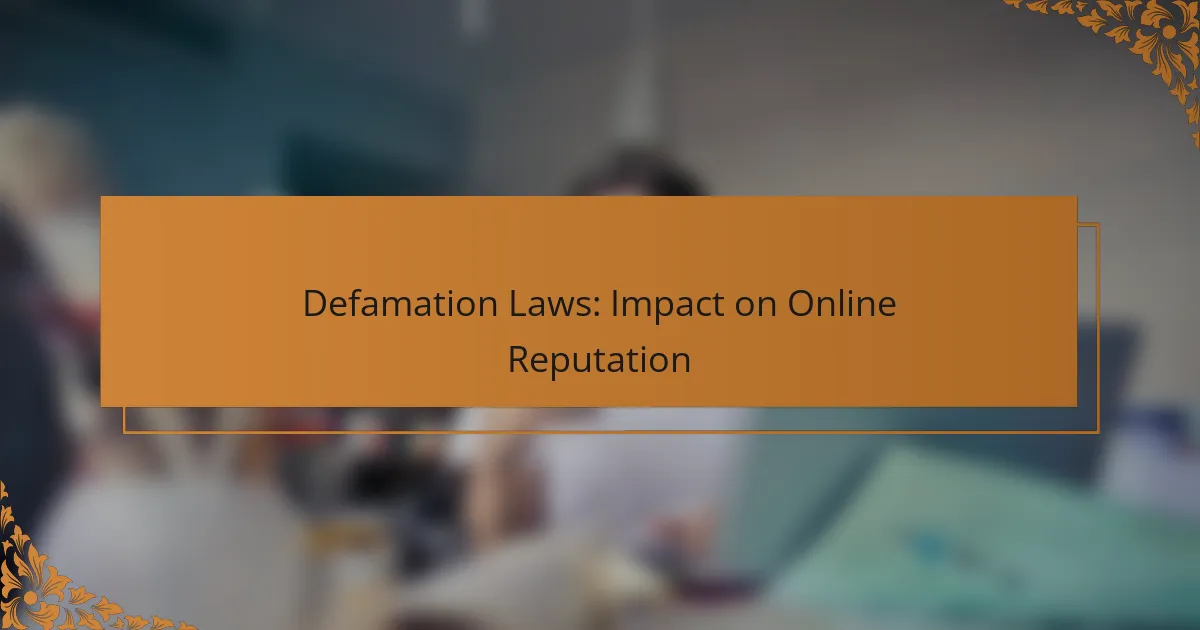Defamation laws play a crucial role in shaping online reputation by offering protection against false statements that can harm individuals and businesses. In the UK, these laws encompass both libel and slander, allowing victims to seek legal remedies to restore their reputations. By understanding these laws and actively managing their online presence, individuals can better safeguard against potential reputational damage.
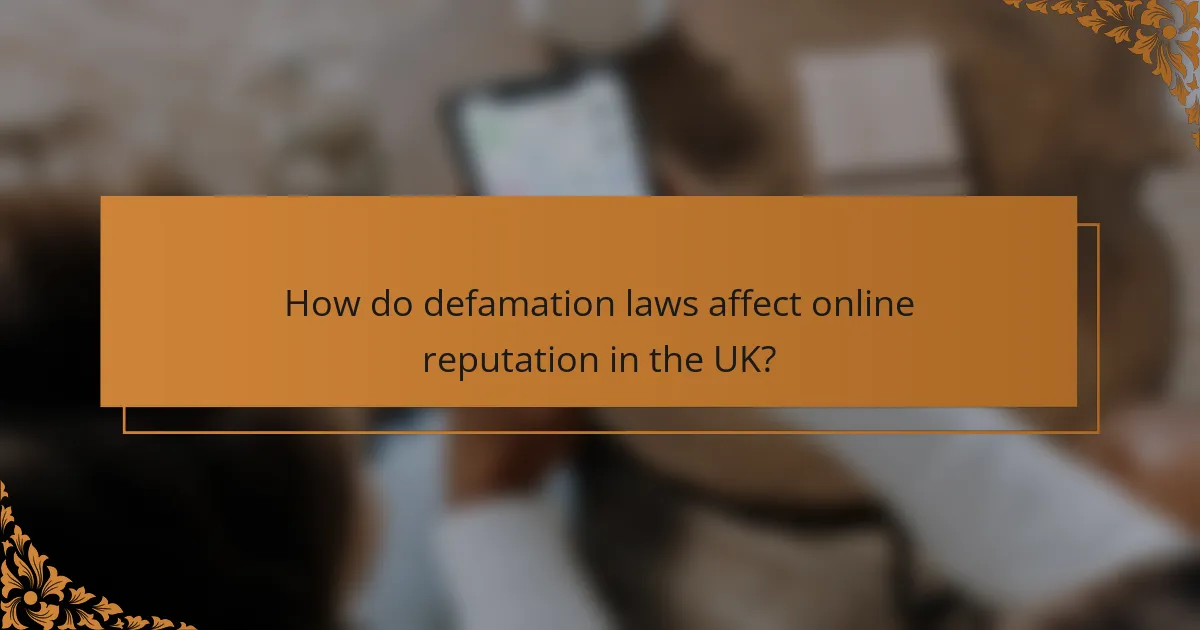
How do defamation laws affect online reputation in the UK?
Defamation laws in the UK significantly impact online reputation by providing legal recourse for individuals and businesses harmed by false statements. These laws protect against slander and libel, allowing victims to seek damages and restore their reputations.
Legal consequences of defamation
The legal consequences of defamation in the UK can be severe, including financial penalties and reputational damage for the offender. Victims can file lawsuits to claim damages, which may cover both economic losses and emotional distress. The burden of proof typically lies with the claimant, who must demonstrate that the statement was false and damaging.
Defamation cases can be costly and time-consuming, often requiring legal representation. It’s essential for individuals and businesses to be aware of the potential risks associated with making statements online, as even seemingly harmless comments can lead to legal action.
Impact on personal and business reputation
Defamation can have a lasting impact on both personal and business reputations. For individuals, false statements can lead to social ostracism, loss of job opportunities, and emotional distress. Businesses may suffer from decreased customer trust, loss of sales, and damage to their brand image.
To mitigate these risks, it is crucial for individuals and companies to monitor their online presence actively. Responding promptly to false claims and seeking legal advice when necessary can help protect one’s reputation. Additionally, maintaining a positive online image through transparent communication and engagement can counteract potential defamation effects.
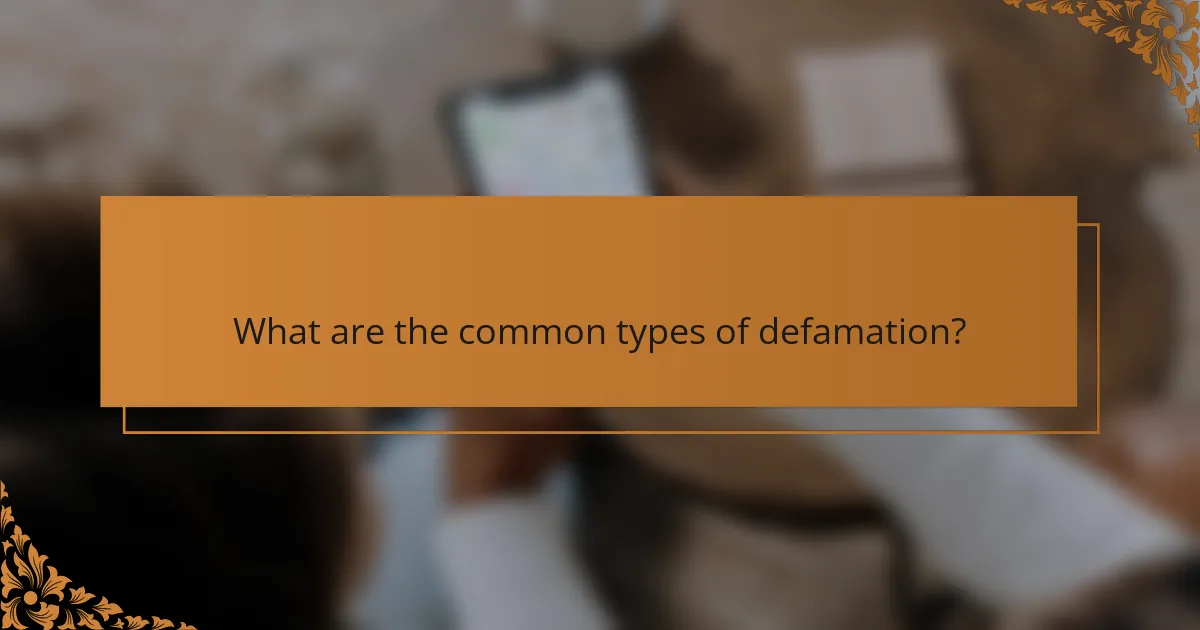
What are the common types of defamation?
The two primary types of defamation are libel and slander. Libel refers to written statements that harm a person’s reputation, while slander pertains to spoken statements that cause similar damage.
Libel as a written defamation
Libel involves false written statements that can damage an individual’s reputation. This can include articles, blog posts, social media posts, or any other form of written communication. For instance, if a news article falsely accuses someone of a crime, it may be considered libel.
In many jurisdictions, the burden of proof lies with the plaintiff to show that the statement was false and damaging. It’s crucial to document any instances of libel, as this evidence can be vital in legal proceedings.
Slander as a spoken defamation
Slander refers to false spoken statements that can harm someone’s reputation. This can occur in conversations, speeches, or broadcasts. An example of slander would be someone falsely claiming that a business owner is involved in illegal activities during a public event.
Like libel, the affected party must prove that the statement was untrue and caused harm. Slander cases can be more challenging to prove due to the transient nature of spoken words, so recording conversations or gathering witness testimonies can be beneficial.
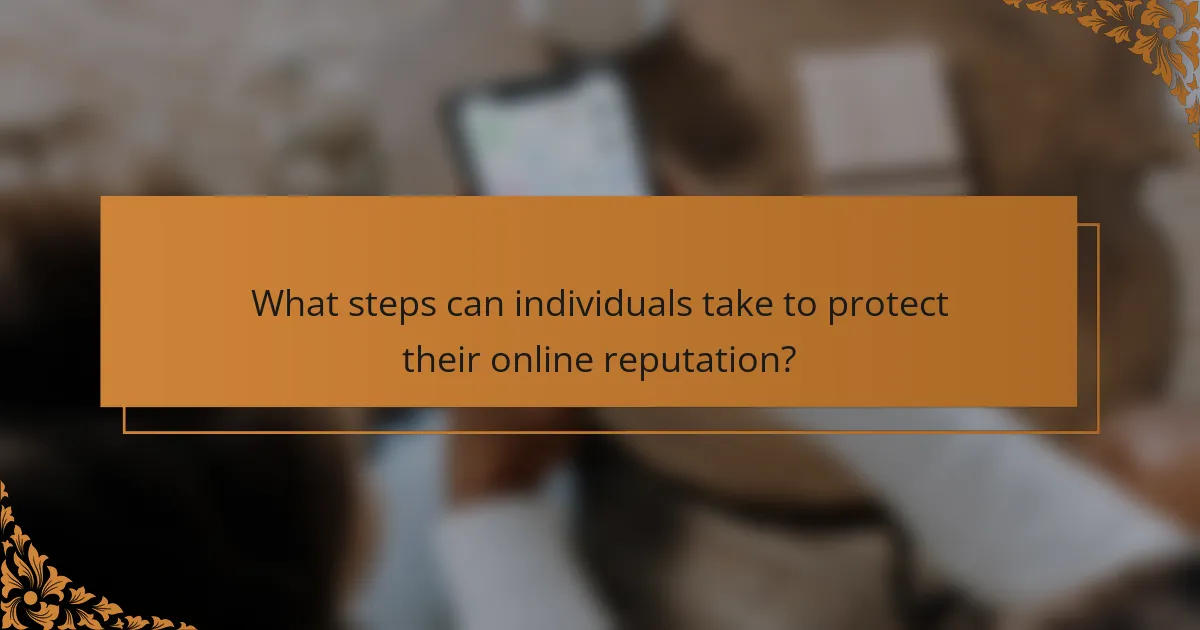
What steps can individuals take to protect their online reputation?
Individuals can take proactive measures to safeguard their online reputation by actively monitoring their digital presence and utilizing reputation management services. These steps help mitigate potential damage from negative content and enhance positive visibility.
Monitoring online presence
Regularly checking your online presence is crucial for reputation management. Set up Google Alerts for your name and related keywords to receive notifications about new mentions. This allows you to respond promptly to any negative content or misinformation.
Consider using social media monitoring tools to track mentions across various platforms. These tools can provide insights into public sentiment and help identify trends that may affect your reputation.
Utilizing reputation management services
Reputation management services can effectively help individuals manage their online image. These services often include content creation, search engine optimization, and removal of negative content. They can be particularly useful if you face persistent negative reviews or defamatory statements.
When selecting a reputation management service, evaluate their track record, pricing, and the specific strategies they employ. Look for services that offer transparent reporting and measurable results to ensure your investment is worthwhile.
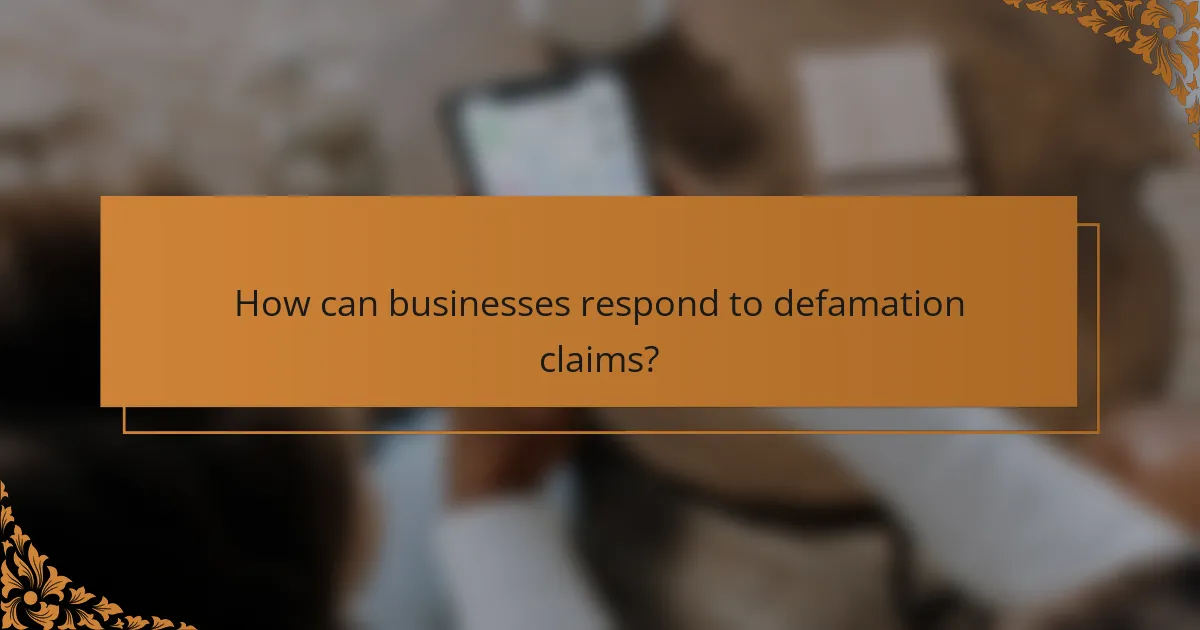
How can businesses respond to defamation claims?
Businesses can respond to defamation claims through legal action or by implementing public relations strategies. Each approach has its own implications and can significantly affect the company’s reputation and operations.
Legal action against defamation
Legal action is a formal way to address defamation claims, involving lawsuits to seek damages or injunctions. Businesses should consider the cost of litigation versus potential reputational harm, as legal battles can be lengthy and expensive.
Before pursuing legal action, companies should gather evidence, such as screenshots or witness statements, to support their claims. Consulting with a legal expert familiar with defamation laws in their jurisdiction is crucial for understanding the viability of the case.
Public relations strategies
Public relations strategies can help mitigate the impact of defamation by controlling the narrative and rebuilding trust. Businesses should proactively communicate with stakeholders, addressing the issue transparently while emphasizing their commitment to integrity.
Effective strategies may include issuing press releases, engaging with the media, or utilizing social media platforms to clarify misinformation. Additionally, companies should monitor online sentiment and respond promptly to negative comments to maintain a positive reputation.
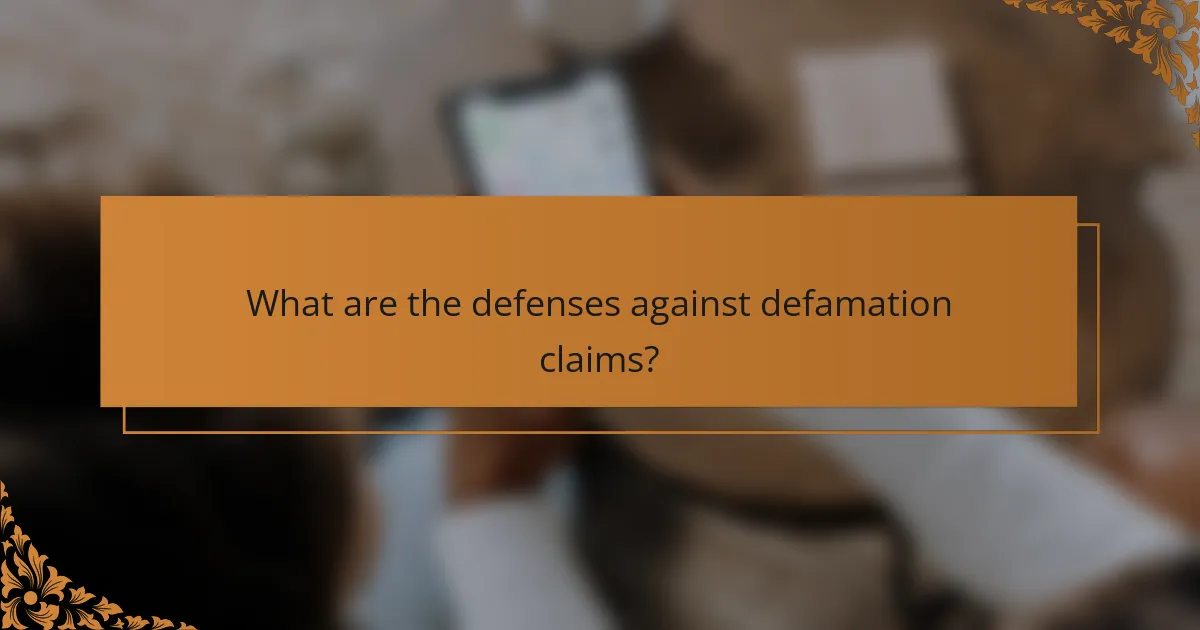
What are the defenses against defamation claims?
Defenses against defamation claims include truth, opinion, and fair comment. These defenses can protect individuals and organizations from liability when statements made about them are challenged in court.
Truth as a defense
The most robust defense against defamation is the truth of the statement. If a defendant can prove that the allegedly defamatory statement is true, they are typically not liable for defamation. This defense is absolute; it does not matter how damaging the truth may be to the plaintiff’s reputation.
For example, if a news article accurately reports that a public figure has been convicted of a crime, that statement cannot be considered defamatory, regardless of its negative impact. It is essential to gather credible evidence to support the truth of the statement in case of a legal dispute.
Opinion and fair comment
Statements of opinion are generally protected under defamation laws, provided they do not assert false facts. This means that if someone expresses a personal opinion about a public figure or a business, it is less likely to be considered defamatory. For instance, saying “I believe this restaurant has poor service” is an opinion and not actionable as defamation.
Additionally, the fair comment defense allows for criticism of public figures or matters of public interest, as long as the comments are based on true facts and are made without malice. This defense is particularly relevant in journalism, where critiques and reviews are common. However, it is crucial to ensure that opinions are clearly presented as such to avoid potential legal issues.
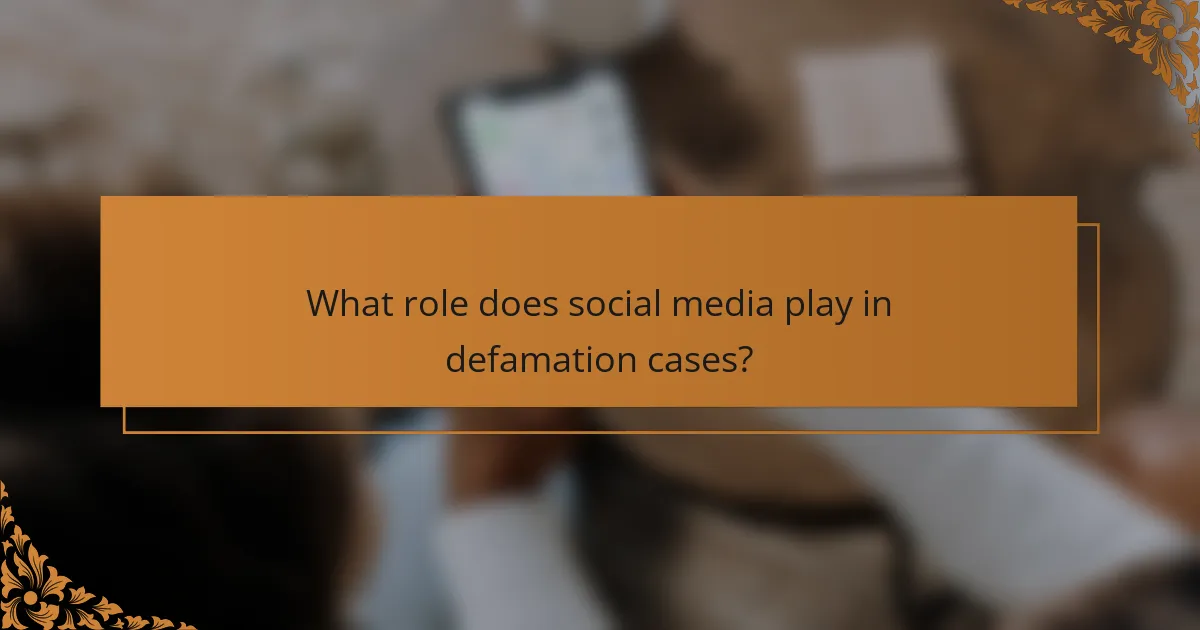
What role does social media play in defamation cases?
Social media significantly influences defamation cases by providing a platform for rapid information dissemination, which can lead to widespread reputational harm. The ease of sharing content increases the likelihood of false statements reaching large audiences, complicating legal recourse for affected individuals or entities.
Increased risk of defamation
The nature of social media encourages impulsive sharing, which raises the risk of defamation. Users often post opinions or comments without verifying facts, leading to potential legal issues if those statements are false and damaging. This environment makes it crucial for individuals and businesses to monitor their online presence actively.
Additionally, the anonymity provided by some platforms can embolden users to make defamatory statements without fear of immediate consequences. This anonymity can complicate the identification of the responsible party in legal cases.
Case studies of social media defamation
Numerous high-profile cases illustrate the impact of social media on defamation. For example, a celebrity may face false allegations on Twitter, resulting in significant public backlash and financial loss. Such cases often highlight the challenges of proving defamation, as the statements may be classified as opinions rather than facts.
Another example involves businesses facing negative reviews or comments on platforms like Facebook or Yelp, which can damage their reputation. Companies often respond by seeking legal action, but they must weigh the potential backlash from further public scrutiny against the benefits of pursuing a defamation claim.
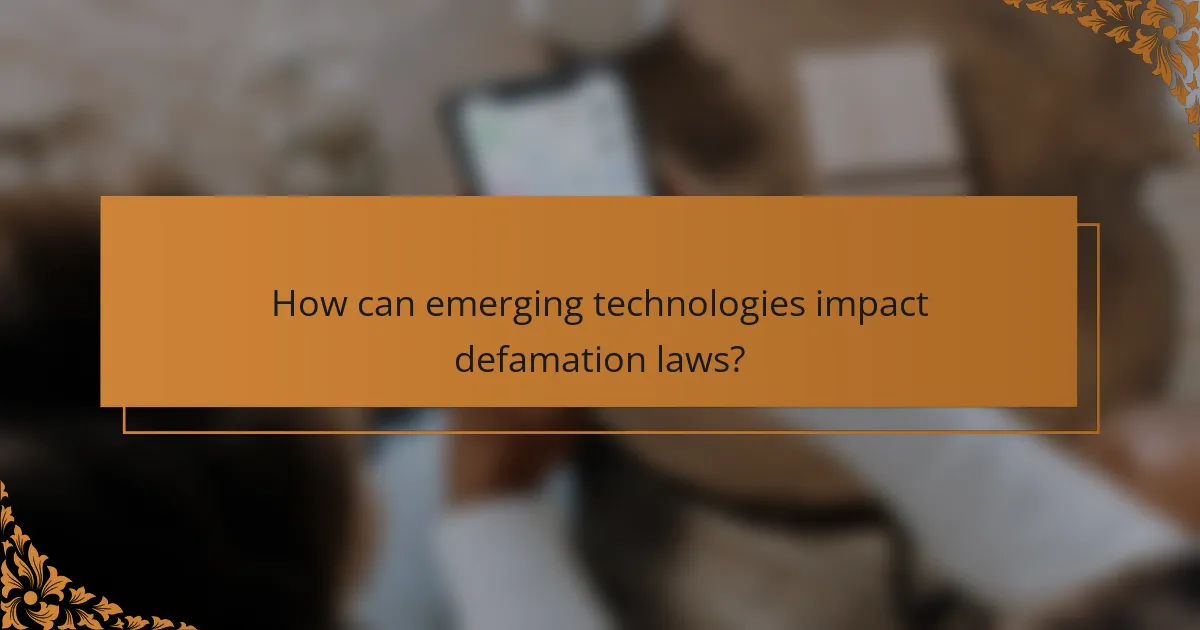
How can emerging technologies impact defamation laws?
Emerging technologies significantly influence defamation laws by changing how information is disseminated and moderated online. Innovations such as artificial intelligence and automated content moderation systems can both help prevent defamatory content and complicate legal accountability.
AI and automated content moderation
AI and automated content moderation tools analyze user-generated content to identify and filter out potentially defamatory statements before they reach a wider audience. These systems rely on algorithms that assess language patterns, context, and user behavior to flag harmful content.
While AI can enhance the speed and efficiency of content moderation, it also poses challenges. For instance, automated systems may misinterpret context, leading to false positives where legitimate speech is wrongly flagged as defamatory. This can result in censorship and affect users’ freedom of expression.
To effectively utilize AI in moderation, organizations should regularly update their algorithms and incorporate human oversight. A balanced approach can help mitigate risks while ensuring that harmful content is addressed promptly.
